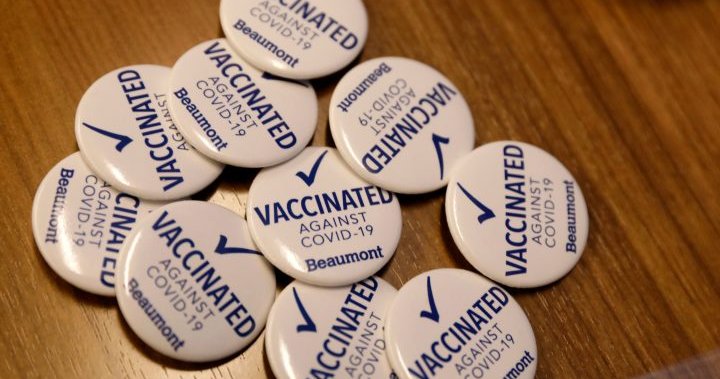If you have been vaccinated against the coronavirus, you probably received a celebratory “I got my COVID-19 vaccine” sticker or posted a picture on social media marking the momentous occasion.
As an increasing number of Canadians get ready for a two-dose summer, there are other ways to let people know you’re fully vaccinated – and therefore safer to be around.
Read more:
Fully vaccinated against COVID-19? Canada unveils new guidance on what you can, can’t do
A variety of COVID-19 vaccine-themed merchandise – T-shirts, mugs, water bottles and pins — has sprung up online and in stores recently. The demand is growing and sellers are cashing in fast.
Mark W. Gray started advertising his “Fully Vaccinated” nickel-plated pins on Etsy, a global online marketplace, back in March.
Since then, he has sold roughly 11,000 pins that are priced at roughly CAD$6.50 each. It has been a “rollercoaster ride,” says Gray, who owns a film production company in Los Angeles, Calif.
Mark W. Gray designed his ‘Fully Vaccinated’ pins in two days, he says.
Photo supplied
“Etsy shut my store down after a week because I was selling really fast,” the 55-year-old told Global News. In one week, Gray made roughly CAD$11,000, he says.
“There’s been all these real peaks. There have been days where it just surged like crazy and I’ve sold like a thousand pins in a day.”
Despite all the profits, this vaccine swag may be more than just a marketing gimmick, according to some.
Health communication experts say wearing a symbol that indicates your vaccination status can serve as a safety net for others and raise vaccine awareness.
“If somebody is going to that trouble to demonstrate visibly that they’re vaccinated by wearing something, then I think it could certainly help to put people at ease,” said Susan Krenn, executive director of the Johns Hopkins Center for Communication Programs.
Read more:
From vaccine passports to prices: Experts answer questions on the summer travel season
The physical emblems can also help start a conversation, prompting others to ask questions about any concerns or side effects, for instance, she said.
“It can be quite valuable for that purpose.”
Vish Viswanath, professor of health communications at the Harvard School of Public Health, said the wearables could also help nudge those who are still sitting on the fence or are hesitant about getting vaccinated.
“I’m not saying it’s the most potent way, but certainly a good way … encouraging others to do it and make it more acceptable,” he told Global News.

Proof of vaccination concerns
In the United States, ImmunaBand, a blue silicone “COVID-19 Vaccinated” bracelet with a metal tag has been introduced. It links a QR code to your vaccination record.
Like the U.S., Canadians who have been fully vaccinated against COVID-19 recently received some clear guidance about what they can and cannot do differently.
Read more:
COVID-19 vaccine: What employers can — and cannot — demand in Canada
Last week, the Public Health Agency of Canada (PHAC) released a list of dos and don’ts for Canadians who have received either one or two doses of the vaccine, as well as public health guidelines for both outdoor and indoor settings.
While there is no obligation to prove your vaccination status — at least for now in Canada – Krenn warns that there is also the risk of creating divisions and putting people off by wearing a symbol.
“It can create that kind of animosity or sense of division,” she said.
“It’s ground that needs to tread a little bit carefully and I think, most importantly, respectfully.”
Wearable magnetic pins by Covid Status Wear.
Photo credit: Hal Stata, Stata Productions
Matt Streem, president of Covid Status Wear, says they have gone a step ahead in saving people from what may feel like long-winded, awkward conversations about their COVID-19 status.
“People didn’t want to wear their test on their head or their medical information on their body to tell people, so we created this item,” he told Global News.
His Ohio-based company is selling wearable magnetic pins and black face masks that say: vaccinated; negative test; temperature normal; recovered and cleared; as well as quarantine released.
“The biggest thing we’ve heard people say that has affected me the most is that if they were sitting on a plane next to somebody who was wearing a vaccinated pin or a recovered and cleared pin, they would feel better,” Streem said.
There are different guidelines in the U.S. and Canada for fully vaccinated individuals.
Photo credit: Hal Stata, Stata Productions
Streem’s “vaccinated” pins with red VX initials have been especially popular among pharmacists, who want to wear them while working, he says.
Gray said the soaring demand of such merchandise is a short-term trend that will eventually burn out, but for now, he and many others are riding the pandemic wave.
“We are social creatures. People want to do what everyone else is doing.”
View link »
© 2021 Global News, a division of Corus Entertainment Inc.

















































